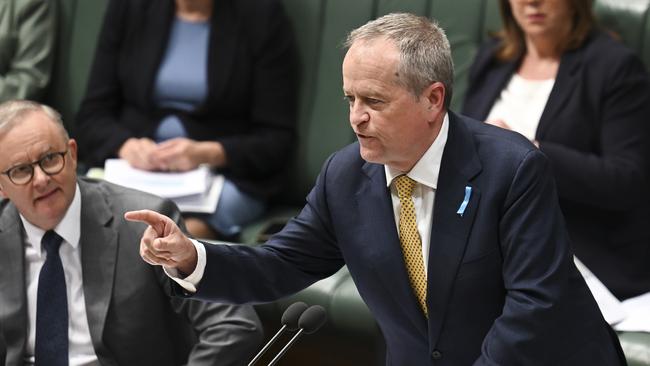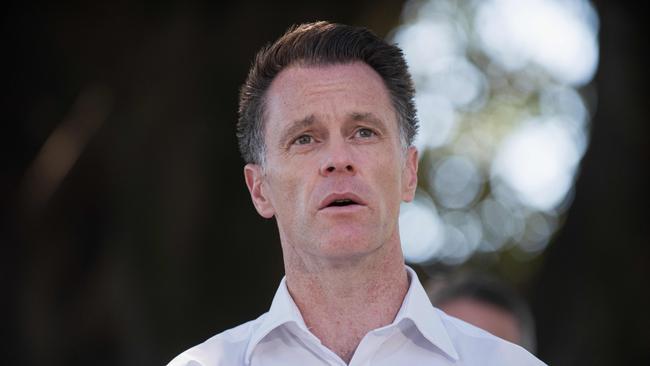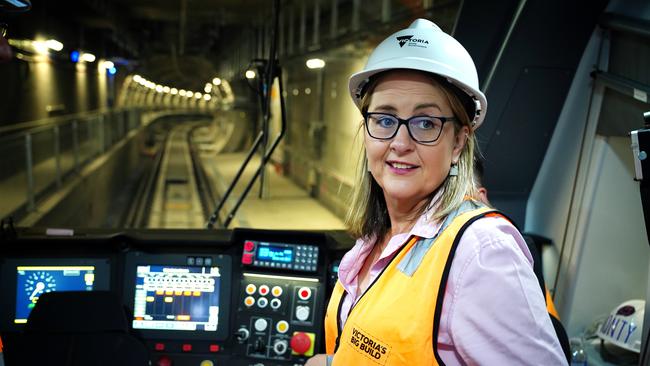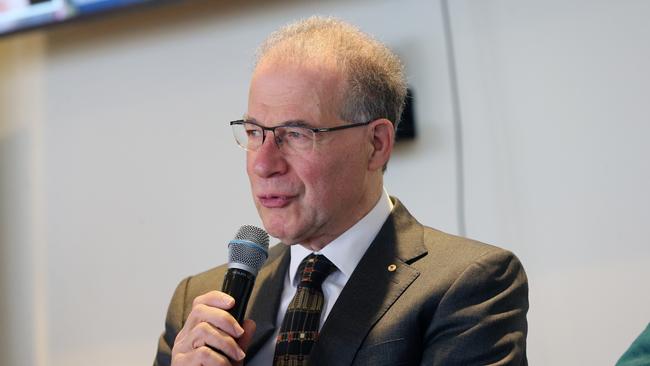Federal-state NDIS stoush coming to a crunch
Bill Shorten has accused the states of downplaying billions of dollars in current federal funding amid an increasingly acrimonious national cabinet negotiation.

Bill Shorten has accused the states of downplaying billions of dollars in current federal funding to support disabled people outside the National Disability Insurance Scheme amid an increasingly acrimonious national cabinet negotiation over how to bring its $42bn cost under control.
The federal NDIS Minister points to a $3.1bn commonwealth funding commitment for school students with a disability in 2023 as an example of federal support being ignored in the stoush over whether states should contribute more to disabled people to take pressure off the national scheme.
With the future of the NDIS on national cabinet’s agenda on Wednesday, state leaders have questioned the prospects of striking a new deal to recast disability support within and outside the scheme, and even whether the federal government has negotiated in good faith.
Mr Shorten’s spokeswoman said he “remained optimistic a deal will get done” but, pointing to the disability education funding, said it can’t be forgotten that “disability support services are shared responsibilities”.
“It has always been a partnership between the commonwealth and the states,” she said. “Frankly, the minister is more interested in helping Australians with a disability and their families than a state versus federal argument.”
The catalyst for the political stand-off has been a widely anticipated review of the NDIS, now in the hands of federal and state governments. The 1300-page document is not yet public but is understood to recommend significant changes, in particular that more “foundational” support be provided for disabled people outside the NDIS, including in mainstream settings such as schools.

Another reason is cost. With NDIS cost projections approaching $100bn a year by 2032, state and federal governments in April stepped in to set a cost growth target of 8 per cent, down from recent 14 per cent annual growth.
The federal government is more affected as under the original scheme agreement cost growth for the states it bears an increasingly greater share (currently 68 per cent and heading to 80 per cent by 2032).
The Australian understands the Albanese government will table a new disability funding deal for the states and territories to consider, possibly through a broader health funding arrangement that covers some of the extra state-funded cost of services for people with disability outside the NDIS.
The states have flagged that they will look to tie any NDIS changes to a new GST revenue agreement at the cost of an extra $5bn a year.
Asked about the chances of an NDIS agreement being struck at national cabinet, NSW Premier Chris Minns said he “wouldn’t say likely, (but) we’re hopeful”.
“If Bill Shorten wants to remove people from the NDIS, he can do it and we’re not going to stand in his way, (but) what he can’t say is the states will take over the services because we handed over both our public servants and our money to the commonwealth a decade ago for them to run it,” Mr Minns said.

He said the commonwealth couldn’t negotiate changes to the NDIS without recognising the consequences to state budgets.
“I don’t think that’s unreasonable (that) with the states on the hook for public transport, education and the health system, all of which are growing exponentially, many of which we’re doing by ourselves, and now the commonwealth is saying we also want you to take responsibility for disability services, that has to be done in a joint effort.”
Victorian Premier Jacinta Allan said it was clear the NDIS was having challenges but she was concerned her government had not been kept in the loop about the financial implications of the proposed reforms.
“We’ve been disappointed that not all of the information about these reforms have been provided to the states in a timely way, in a fulsome way,” she said.

“We’d hoped there would have been better information flow coming to the states to make what are really big and important decisions,” she said, adding that her negotiations would be directly with Anthony Albanese.
Disability advocates are becoming concerned that those with disability are being forgotten amid the politics.
Disability Advocacy Network Australia director of policy and advocacy El Gibbs said the national cabinet meeting was a chance for “all governments to get serious about working with people with disability to deliver fair, accessible and available public services for us all”.
“People with disability are not political footballs to be traded off for a share of the GST,” she said.
“We are equal citizens, and we need equal access to public services, the community and the support we need from all governments.”
The NDIS has been under growing cost pressures, leading to Mr Shorten calling for a full scheme “reboot” in April, having already commissioned the review last year.
The review, to be published this Thursday, is anticipated to be far-reaching in its recommendations for the 630,000 people currently on the scheme and the 4.4 million Australians who live with a disability.
Review co-chair Bruce Bonyhady, a disability advocate, has called for a new federal-state agreement to build support for disabled people outside the NDIS.

He has noted that since the NDIS came into being, other disability services have disappeared, leaving individuals and families living with disability with little choice than to pursue a place on the scheme.
This has been a particular issue among children with autism. There are 270,000 children with a primary diagnosis of autism on the NDIS. Twelve per cent of all boys in Australia aged 5-7 are NDIS participants.
It is anticipated that the upshot of the scheme’s recommendations, if adopted, would see some children with autism that had less of an impact on their functional capacity eventually taken out of the NDIS.
Mr Shorten moved to reassure people with disability and their families that there would be a “transparent transition”.
“We are not going to change things overnight,” he said.






To join the conversation, please log in. Don't have an account? Register
Join the conversation, you are commenting as Logout